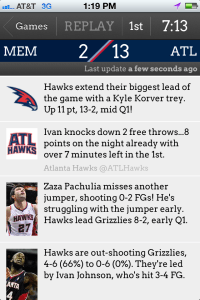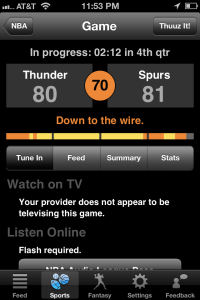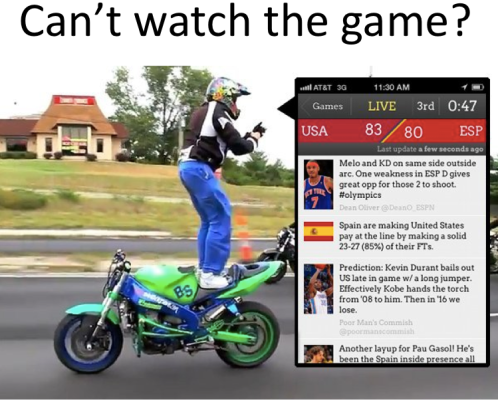With the NBA season now fully underway and our attention spans being continuously pushed to the max (not to mention Yahoo’s pissing off fantasy football fans), it seems like the perfect time to introduce you to The Chadwick Project.
Nikolai Yakovenko, a former Google Search engineer and rabid basketball fan, founded Chadwick earlier this year to bring some machine learning and artificial intelligence to NBA coverage in an attempt to reduce the noise and personalize our consumption thereof. Chadwick, now live on the App Store and Google Play, is what Yakovenko calls a “non-intrusive,” realtime sports app, which delivers immediate coverage of live NBA games to your phone via text and push notifications.
Realtime sports coverage is something that most of the big content houses are in various stages of testing, as has become evident from ESPN’s recent announcements. BleacherReport is doing the same, as is SportStream (which spun out of Evri) — to name a few.
Twitter and other social networks have become a vital part of how sports fans check into games and peruse content, both during play and after. These “second-screen” apps provide better ways to consume and share content in realtime, with the idea being that TV viewing and more become more participatory and interactive as a result.
 This second screen experience is one of the use cases Yakovenko envisions for Chadwick. Having created a proprietary, patent-pending artificial intelligence tech, the app generates instant commentary and updates on live sporting events, as it tracks events as they happen in realtime. Chadwick peruses social media and game stats, picking out the most relevant Twitter updates from professional sports writers and fans alike, for example, and then generates live updates that are personalized for the viewer and pushed to their phones.
This second screen experience is one of the use cases Yakovenko envisions for Chadwick. Having created a proprietary, patent-pending artificial intelligence tech, the app generates instant commentary and updates on live sporting events, as it tracks events as they happen in realtime. Chadwick peruses social media and game stats, picking out the most relevant Twitter updates from professional sports writers and fans alike, for example, and then generates live updates that are personalized for the viewer and pushed to their phones.
The idea, in case it’s not clear, is to send player news, expert commentary and comprehensive stats to you, the viewer, within seconds of the game-changing goal, highlight dunk, etc. While Chadwick is currently only available for the NBA, the founder tells us that it is developing a similar system for football, which the team hopes to launch in the next few months. One can see the application here for fantasy sports nuts, who want to receive personalized updates on their teams and players in realtime. The NBA isn’t quite as popular among fantasy players, but when Chadwick opens to football, it will have the potential to reach a much larger audience.
 The key, the Chadwick founder tells us, is that users can tune into either the subdued narrative of a national sports writer or the more effusive live-tweeting from a local sports writer. Either way, the startup’s technology focuses on bringing you high-quality writing and content.
The key, the Chadwick founder tells us, is that users can tune into either the subdued narrative of a national sports writer or the more effusive live-tweeting from a local sports writer. Either way, the startup’s technology focuses on bringing you high-quality writing and content.
“It’s difficult to do sports reporting well,” Yakovenko says, “and the difference between an excellent sports reporter and the rest can be dramatic, so the advantage of Chadwick, for sports fans, is that they have access to instant reporting for every game, without the mistakes and without missing a play.”
While that may sound like a threat to those who make their living covering these games, the founder says that Chadwick isn’t meant to replace TV or sports reporters. Instead, it extends live coverage not just to the 30 NBA teams, but to all 335 NCAA D-1 teams, to give users live, quality reporting in a mobile-first user experience.
This quality, realtime coverage is not an easy thing to do, especially when analyzing all of the noise inherent to social media. That’s where Yakovenko thinks Chadwick has a leg up on the competition, because it takes a Watson-like approach to coverage, separating emotional content from the repertorial. If Lebron just hit a game-tying three-pointer with 15 seconds left in the game, you want to see the facts, will there be a time out? Who’s in the game, what players have fouled out? As opposed to seeing an excited tweet in caps from a Miami fan.
 This is where the founder’s experience as a Google search engineer comes into play, as Chadwick is analyzing hundreds of different signals (syntax, natural language, etc.) in terms of how fans and writers are sharing their thoughts. While Chadwick has plenty of competition — if not directly — the founder is of the perspective that it’s a relatively open field at this point, because this kind of technology isn’t built overnight. And “it sucks” — or, is a pain, to create — he says.
This is where the founder’s experience as a Google search engineer comes into play, as Chadwick is analyzing hundreds of different signals (syntax, natural language, etc.) in terms of how fans and writers are sharing their thoughts. While Chadwick has plenty of competition — if not directly — the founder is of the perspective that it’s a relatively open field at this point, because this kind of technology isn’t built overnight. And “it sucks” — or, is a pain, to create — he says.
Once the team launches its football version, they will focus on building partnerships around Chadwick’s other use cases. Yakovenko sees the app being a benefit to drivers who want to check in on games from the road and ask direct questions of Chadwick, like “How many fouls does Kobe have?” for example.
Right now, the app serves its results in a single stream, but the team is considering adding multiple streams so that users can pick and choose whether they want their updates coming from, say, professional writers in one app, specific content sources, or just Twitter. It’s still early in the game for Chadwick, but it’s already got a head start on most of the competition. If its tech holds up during early experimentation, there are plenty of potential use cases out there for content-hungry sports fans.
Second image credit:
